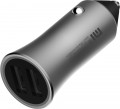The maximum current that the device is capable of delivering to the charging output. This is one of the key parameters for any charger, it directly determines its power and, accordingly, its efficiency with certain batteries. These points are described in detail in the “Power” paragraph below, but here we note that if several values are indicated in this paragraph, it means that the design provides for several connectors with different current specs (or several groups of connectors, each with its own amount of amperes per port) .
As for specific numbers, when charging from USB (used in most modern chargers), the maximum current up to
1 A is considered very limited,
1.5 A is low,
2 A,
2.1 A and
2.4 A are average values, and in the most powerful chargers, this figure can be
3 A,
3.4 A and even
5 A.—
Operation indicator. In some models it also provides additional information about operating modes, malfunctions, etc. Most often, such a light indicator is in the form of a separate light or a clearly visible backlight system. And additional information can be provided by changing the colour of the backlight, by blinking, etc. However, even without these features, the operation indicator provides additional convenience in use. In particular, it allows you to determine whether the charger is receiving power and working normally — this can be useful when diagnosing various problems. It is also possible to use non-standard backlighting — for example, as a night light that makes it easier to navigate in an unlit room (especially since gadgets are often put on charge just at night).
—
Display. Own display on the charger case. This is usually the simplest screen with a few characters, but it is enough to display various additional information that makes life easier for the user: current voltage and current values, fast charging status, error codes, etc. On the other hand, this complicates the design, but in fact such information is required less often; Therefore, very few chargers with displays are produced.
— Detachable charger power cable. Cable for connecting the charger to the power source, which has a removable design. By itself, connecting to a power outlet using a separate wire (both re
...movable and non-removable) is rarely used in charger devices — mainly in devices for which the “plug on the case” type design is not suitable (this is primarily wireless models, as well as wired charger devices with an abundance of connectors and corresponding dimensions). Specifically, the removable design is convenient in two ways: firstly, the wire can be removed and compactly folded for storage and transportation, and secondly, if the cable is damaged, it can simply be replaced, no need to bother with repairs. The disadvantages include an increased probability of losing the cable, as well as a slightly lower reliability than with a non-removable design (the latter, however, becomes noticeable only with frequent connections/disconnections that wear out the connector).
— Non-detachable charger power cable. Cable for connecting the charger to the power source, rigidly fixed to the device and not intended to be disconnected. It occurs much less frequently than the removable one described above, since it is less convenient if necessary to compactly fold the device; and if the wire is damaged, most likely, you will have to carry the charger to a service centre. On the other hand, you can lose such a wire only together with the charger itself.
